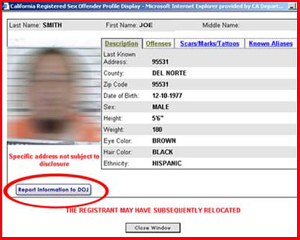Sex Registration
Riverside Sex Registration and Sex Crimes Attorney
Sex Offender Registration Lawyer in Riverside
 The political and societal pressure over sex crimes in America has shaped a “legal system” that often over-powers and snuffs out the rights and liberties of innocent people. It is not uncommon for a person accused of a sex crime to literally be deprived of his or her constitutional right to be presumed innocent until proven guilty. Persons convicted of a sexual crime in California are often required to register as a sex offender. It is a lifelong burden and if you can avoid it you should – at any cost!
The political and societal pressure over sex crimes in America has shaped a “legal system” that often over-powers and snuffs out the rights and liberties of innocent people. It is not uncommon for a person accused of a sex crime to literally be deprived of his or her constitutional right to be presumed innocent until proven guilty. Persons convicted of a sexual crime in California are often required to register as a sex offender. It is a lifelong burden and if you can avoid it you should – at any cost!
History of Sex Offender Registration in California
It has been almost 65-years since California’s sex offender registration program was enacted in 1947. California, always the “first” to take on many social, cultural or political issues, was the first state in the nation to require convicted sex offenders to notify local law enforcement agencies of their whereabouts. California has required those considered “dangerous sex offenders” to routinely register their address with local authorities.
Sex Offender’s Names Become “Public Record” in 1996
In May 1996, President Clinton signed the federal Megan’s Law which encouraged state legislatures (arm twisted via federal funding) to register sex offenders (California already did this) and disseminate information regarding sex offenders to the public (which California then started). With these changes, sex offenders are now required to register with local authorities for the rest of their life if they go to school, work or live in the State of California. This information is available to the public so that anyone with computer access can find out the current whereabouts of any registered, convicted sex offender.
Sex crimes most often requiring registration are:
- Rape
- Sexual Battery
- Indecent exposure
- Child pornography
- Lewd acts with a minor
- Incest
What personal information will the public have access to?
- Your name
- Your home address (a map pin will show your home address)
- Your color photo
- Your height
- Your weight
- Your hair color
- Any physical identifying marks such as tattoos or scars
- Any AKA’s (known aliases)
- A description of the charges
If you are convicted of a qualifying crime you are then required to register and re-register EVERY YEAR on or within 5 days following your birthday for the rest of your life. Moreover, should your address change, you must also re-register within 5 days after changing residences.
If you are required to register as a sex offender it is in your best interest to contact a Riverside sex crimes defense attorney who can help ensure that you are fulfilling the requirements or can talk to you about some limited but possible options to get the requirement and the lifelong burden lifted.
What If a Person Fails to Register or Re-Register as a Sex Offender?
Considering the large database of sex offenders, it is quite common that an individual will fail to register. It is common knowledge that once a person has had their “milestone birthdays” such as becoming 18 or 21, many purposely never celebrate subsequent birthdays, and often overlook the significance of their birthday on purpose or because they give the recurring date no special significance. For example, how many licensed drivers, to their chagrin, have inadvertently allowed their drivers license to expire? Unfortunately, in the case of registering as a sex offender the legal system takes such oversights very seriously! It will likely require the help of a criminal defense attorney to get involved to mitigate the penalties and punishments involved.
Criminal Defense attorney Jeffrey Williams can help you avoid a misdemeanor or felony charge for a failure to register or re-register as a sex offender by working with law enforcement agencies and the prosecutors. There is often a valid reason for one’s failure to register, or perhaps you have been falsely accused of failing to register. Whatever your situation, it is always best to contact someone expert in criminal charges to stand beside you for the best possible outcome.
